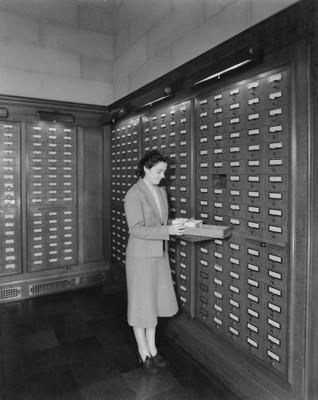Researching your dissertation
When it comes to thinking about dissertations, it's useful to know how and where to look for material, both within Cambridge and further afield. The following is some guidance on finding various different types of material, whether primary or secondary.
Secondary
- Finding books in Cambridge
- Ebooks
- Finding books outside Cambridge
- Finding articles
- Unpublished material
Primary
For further help our LibGuide has lots of information about how to carry out research in History.

Finding secondary material
The best place to begin looking for secondary material is a specialist bibliographical database covering your area of interest, eg. the Bibliography of British and Irish History. Teaching staff will be able to advise on what databases there are in your subject area. There may not be a specialist database covering your topic, in which case a more general literature search may be the best way to begin. Literature searches may also help you to find supplementary material, and to identify what is available within Cambridge.
Literature searches will help you to identify a viable topic of research, or a new angle from which to approach a subject, and they will also ensure that you do not duplicate work in progress. You will need to be compiling lists of material to consult at the same time as taking organised notes and writing; you should not wait to complete the reading before beginning to write.
Finding books in Cambridge
For searching across library catalogues in Cambridge, use iDiscover; as well as searching library holdings it also retrieves records for ejournals and ebooks, and can be extended to search databases such as JSTOR. You can also turn searches into RSS feeds (for alerts when any relevant items are added to the catalogue).
Ebooks
The University's ebooks@cambridge team subscribe to thousands of ebook titles, including key resources such as the Cambridge Histories and Cambridge Companions. These are searchable through iDiscover; if there is an electronic copy of the book you are looking for, it will have the phrase "[electronic resource]" in the record after the title, and you can follow the link in the record directly through to the text. Ebooks are easy to use, can be accessed from home and can normally have several users accessing the text simultaneously, so access is almost always available.
Finding books outside Cambridge
You may need to extend your search beyond Cambridge, to see if there is material available elsewhere which is not held by any of the libraries in the university. Library Hub Discover is the best way for finding material held in libraries in the United Kingdom; it is the combined catalogue of the UK's major research libraries (including the British Library, National Library of Scotland and National Library of Wales), as well as various specialist research libraries and collections. The catalogue contains over 32 million records. It is possible to search by subject, author, title or keyword, and you can restrict your search by date, place published, type of material (eg. periodicals, maps), or language. Search results will display where an item is held, and provide links to an electronic copy, if there is a freely available one.
The Document Delivery Service is available to help support students access difficult to locate material. This includes Inter-Library loan and Rapid Inter-Library loan.
If you are working away from Cambridge (for example, during the vacation), you may be able to get access to other higher education libraries in your area; visit SCONUL Access for more information.
For catalogues of libraries outside the United Kingdom try WorldCat, a catalogue of over 10,000 libraries, which indexes 1.5 billion items.
Finding articles
You will need to look at journal articles as well as books, as journals are often where the latest, most up-to-date historical research is published. There are several citation databases which you can search for articles which might be relevant to your topic. As well as general historical databases, there are also more specialised ones, covering various regions, periods and topics. (Most of these will require a Raven password for off-campus access.) To search across the full range of electronic journals Cambridge subscribes to go to the ejournals@cambridge page. It is also possible to search across popular databases for article titles (as opposed to journal titles) on iDiscover.
Key general databases
- Historical Abstracts: This covers the history of the world from 1450 to the present (excluding the United States and Canada). Published since 1954, it indexes over 3,100 academic historical journals in more than 40 languages; thousands of new citations are added every year.
- Scopus: This database is by far the largest citation database available to members of the University. It covers a range of disciplines and includes information about where articles have been cited.
Digital journal archives
- JSTOR: A digital archive of over 1,000 journals; it can be subject-searched and gives immediate online access to articles in titles to which the University subscribes.
- Project Muse: Full-text access to nearly 500 journals from over 130 scholarly publishers.
Region/country databases
- America: History and Life: A companion title to Historical Abstracts. There is not online access, but the print copy can be found in the University Library (North Front, Floor 6, classmark: P660.b.31).
- Bibliography of British and Irish History: A bibliographical database of historical writing dealing with the British Isles, the British Empire and the Commonwealth, from 55 B.C. to the present, containing over 500,000 records. (It is worth noting that it is not an exhaustive bibliography of works relating to the British Empire and the Commonwealth; it covers the relations of those countries in the Empire and the Commonwealth with Britain.)
- Bibliography of Asian Studies: A bibliographical database covering articles and book chapters on all parts of Asia published since 1971.
- Index Islamicus: A bibliographical database of books, articles and reviews on Islam and the Muslim world.
Chronological databases
- International Medieval Bibliography: A bibliographical database covering medieval civilization, containing over 440,000 records.
Topical databases
- ATLA Religion Database: A bibliographical database covering theology and church history, containing over 1.7 million records.
- Bibliography of the History of Art: A bibliographical database on European and American art from late antiquity to the present, covering material published between 1975 and 2007.
- History of Science, Technology & Medicine: amalgamation of a few separate bibliographies. Includes historiography and the role of science in society and culture from prehistoric times onwards.
Unpublished material (dissertations and theses)
There are several different databases for searching for university dissertations and theses, whether produced in the United Kingdom or further afield.
- History Online: Contains a directory of history theses and research Masters produced in the U.K. since 1970, along with a list of theses currently in progress.
- EThOS: The national thesis service: a British Library-administered database of over 300,000 theses from U.K. universities. Those which have already been digitized can be downloaded for free, but if the thesis you want to look at has not yet been digitized, you will have to pay a fee. (Cambridge dissertations are listed on Ethos but not supplied by the service.
- ProQuest Digital Dissertations: A database of 2.4 million dissertation and theses citations from 700 academic institutions worldwide, offering full text for most of the dissertations added since 1997.
- Apollo: Cambridge University's institutional repository. Includes a collection of voluntarily deposited Ph.D. theses.

Finding primary sources
Online sources
You can access more online resources through iDiscover and the UL's eresources@cambridge page, which includes links to visual and sound resources, film and video services, and newspapers (both archives and current).
Some examples of online collections of primary source material:
- American Memory (Library of Congress): online collection of documents for American history, comprising written and spoken words, sound recordings, still and moving images, prints, maps, and sheet music.
- British History Online: digital library of primary and secondary sources for medieval and modern history of the British Isles
- Empire Online: online collection of original documents relating to empire studies, including exploration journals, periodicals, government papers, maps.
- First World War: Personal Experiences: database of digital images of original documents, including diaries, letters, personal narratives, scrapbooks, and visual sources.
- German History in Documents and Images: digital collection of original historical materials documenting German history from the beginning of the early modern period to the present.
- UK Parliamentary Papers includes over 200,00 House of Commons sessional papers from 1715, with supplementary material back to 1688.
Archives
In Cambridge
ArchiveSearch provides finding aids and links to digital records for the majority of archives located in the city of Cambridge., including the archives of many colleges, and of the Churchill Archives Centre.
In the United Kingdom
You may need to visit archives outside Cambridge as part of your research. To find out what archival material is held where, there are various union catalogues of archive material:
- National Archives: Formerly the Public Record Office, this repository holds the national archives for England, Wales and the United Kingdom (there are separate national record offices for Scotland and Northern Ireland). They have extensive online catalogues, which can be searched by subject, and you can access their online collections and download copies of documents.
- National Register of Archives: A register of over 44,000 unpublished lists and catalogues, detailing the nature and location of manuscripts and historical records relating to British history. These are "non-official" archives covering the holdings of local record offices, national and university libraries (including Cambridge), specialist repositories, museums and other bodies in the United Kingdom and abroad, as well as papers held privately by individuals, firms and institutions. The research guides on the website explain how the National Register of Archives can be used for locating material on particular topics.
- Archives Hub: A national gateway to descriptions of archives of over 180 UK repositories (including Oxford and Cambridge); again, you can search by subject.
Worldwide
To search the holdings of archives outside the United Kingdom, try Archive Grid, a major catalogue of historical documents, personal papers and family history material held in repositories around the world; you can search for collections by topic.
Subject gateways
Subject gateways are online portals to subject-specific resources, and can be excellent places to look for more information on your topic. Some gateways where the sites have been evaluated by experts include:
- History Online: Created by the Institute of Historical Research, this initiative indexes books and journal articles, details history lecturers in the U.K., digital history projects, and current and past historical research.
- History Data Service: This project collects, preserves, and promotes the use of digital resources, which result from or support historical research, learning and teaching.
- Connected Histories: A collection of digital resources on early modern and 19th century British history.
